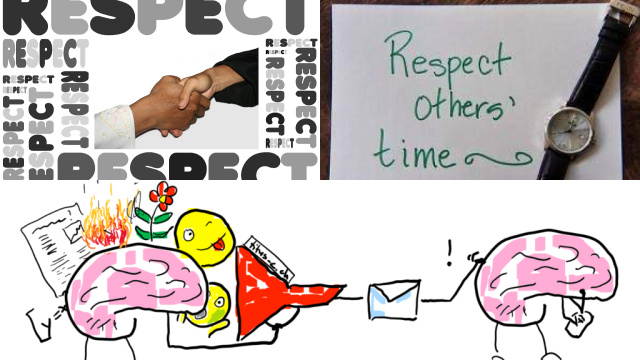Rule #1: Respect others’ time and attention
The rule of netiquette that talks about the respect of other people’s time and attention is a very important one. We should refrain from sending nonessential emails or messages that will make someone’s inbox full and divert their attention from important tasks.

We must not interrupt others when they are talking, neither face-to-face nor online. Through the act of respecting others’ time and attention, we can develop stronger bonds, enhance communication, and thus create a more positive online community. Finally, netiquette is about the way we should treat others, both on the Internet and offline, as we would like to be treated.
Rule #2: Think before you post or send a message
First of all, before posting or sending a message, stop and think about its tone, content, and the possible effect on others. Do not post or send messages that are either hurtful, disrespectful, or offensive. On the contrary, our aim should be to communicate positively and respectfully. Besides, we should also be aware of our audience and adjust our message according to them.
Rule #3: Use appropriate language and tone
The manner of communication we have online can make a great difference in the way people view us and can, thus, affect our relationships and our interactions with them. Don’t use terms that are offensive or that can be considered as causing harm to other people. This includes, among other things, not using bad words to be not discriminative or to not make jokes that are not appropriate.

Besides, it’s also necessary to take into account the cultural and social norms of the people we are talking to. Be aware of cultural differences and modify the communication style accordingly to prevent misunderstandings or offense.
Rule #4: Avoid offensive and discriminatory language
The use of such language is not only rude but can also cause legal and social problems. The use of derogatory language and slurs can result in discrimination, harassment, and exclusion. It can also generate a hostile atmosphere that can adversely affect the mental and emotional health of people.
Rule #5: Use proper grammar and spelling
The proper use of grammar and spelling demonstrates that you are considerate of your audience and at the same time, clear communication is achieved. Inadequate grammar and spelling not only make your communication difficult to understand but also cause confusion and misunderstandings. Besides, it can be perceived as unprofessional and irresponsible, thus, it can affect your reputation negatively.

Rule #6: Be careful with humor and sarcasm
Joking and sarcasm can be easily misunderstood so it is necessary to be careful when you are using humor or sarcasm in online communications, because what you may think as a joke or sarcastic remark may be understood as an insult or offensive by the person you are talking to.
Rule #7: Respect people’s privacy
To ensure the people’s privacy, refrain from asking for personal information that is not required for the interaction. If you ever really have to ask for personal information, be specific about why you need it and what it will be used for.
Rule #8: Be mindful of cultural differences
In the worldwide online environment, it is important to be aware of cultural differences and to be respectful of the diversity of views and beliefs. Several cultures may have various norms and values, which in turn, may affect communication styles and etiquette.
To be aware of cultural differences, you should learn about different cultures and their traditions. Do not make any assumptions or stereotype anyone based on their cultural background.
It is crucial to maintaining respect and politeness. Discussions online usually do not have the visual and auditory signals that are present in face-to-face interactions, thus, tone and intent are not easily detected. The right selection of words and the refraining from using such language will thus create a more productive atmosphere.

Active listening is the key factor. Rather than concentrating only on the expression of your point of view, try to comprehend the viewpoints of others. Appreciate their worries and answer them wisely, showing that you are interested in communicating.
Private messages or direct communication channels can be more effective than public debates. This method limits the chances of misunderstanding and thus, a more concentrated and individualized conversation can take place.







